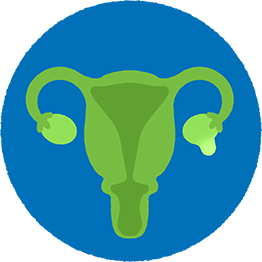

Donna
Vine
From infertility to painful, erratic periods and weight gain, polycystic ovary syndrome — or PCOS — has plagued Paula de Gannes-Beckles for most of her life. Diagnosed as a pre-teen, she’s now a patient partner on a University of Alberta research team with a mission to reduce the risks of serious, long-term health effects on young women with the hormonal disorder. “This is so important to our wellness,” says de Gannes-Beckles. “A lot of women with PCOS do not know about the cardiac risks. And it’s fearful! It’s so scary.” She monitors her heart health and has made lifestyle, exercise and diet changes with the help of researcher Donna Vine, who leads the study into the progression of heart disease in young women with PCOS, which affects up to 15 per cent of people with ovaries. People with PCOS can have enlarged follicles in the ovary that appear like cysts. It affects ovulation and menstrual function, causing problems with fertility as well as acne or hair growth on the face or body. It’s also associated with other health issues, such as weight gain, diabetes and heart disease. With funding from WCHRI and the University of Alberta Hospital, Vine and co-investigator Mahua Ghosh, an endocrinologist, worked with the Alberta Health Services Pathway Unit, clinicians and patient partners to create a PCOS diagnostic tool for doctors and a guide for patients on My Health Alberta. “If we can detect it early and intervene, we could be protecting women in their 30s and 40s from heart disease,” says Vine, a professor in the Faculty of Agricultural, Life and Environmental Sciences and founder of PCOS Together, a patient support and research program. “This disease impacts their family life and their ability to work and study, due to the symptoms. And on top of that, you’ve got the increased risk of several chronic diseases.” Vine’s research has found that Alberta women with PCOS have a two-fold higher incidence of heart disease compared to other women and three to four times the rate of obesity and diabetes. They are also more prone to eating disorders, certain cancers, mental health issues and respiratory disorders. Her team studied 90 women in their 20s and 30s. About half had PCOS, and the other half were a similar age and size. They found that those with PCOS showed many more signs of early heart problems than the other group, including narrowing of the arteries in the neck, which increases the risk of stroke or heart attack. Thanks to a WCHRI Innovation Grant, Vine was able to follow up with the same group a year later. She discovered progressive narrowing of the arteries and other risk factors in about a quarter of those with PCOS, and sent them for more checkups with heart and hormone specialists. Study participants with heart issues were offered help with nutrition and healthy lifestyle choices, as well as medicine for blood pressure, diabetes or weight, if necessary. Vine hopes her research will provide the basis for a national, long-term study of young women with PCOS and others at higher risk for heart problems, and lead to improvements in the prevention of heart disease. To participate, contact PCOSTogether@ualberta.ca. Since 2018, nearly 700 women have participated in studies at the Dale Sheard Centre for Solutions in Women’s Health, the home of research at the Lois Hole Hospital for Women. Donna Vine’s work is supported by the Alberta Women’s Health Foundation through the Women and Children’s Health Research Institute.







 “If we can detect it early and intervene, we could be protecting women in their 30s and 40s from heart disease.”
“If we can detect it early and intervene, we could be protecting women in their 30s and 40s from heart disease.”
Did you know?

